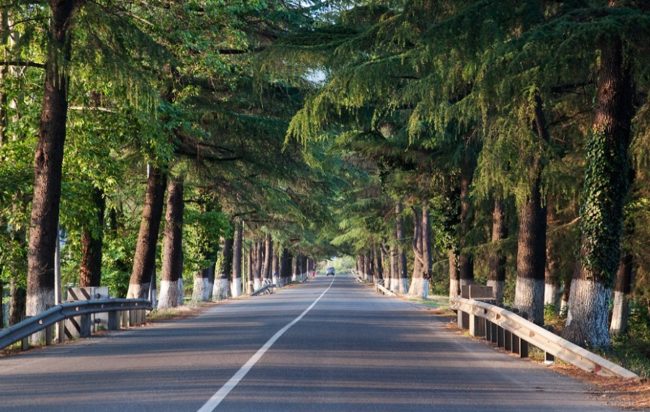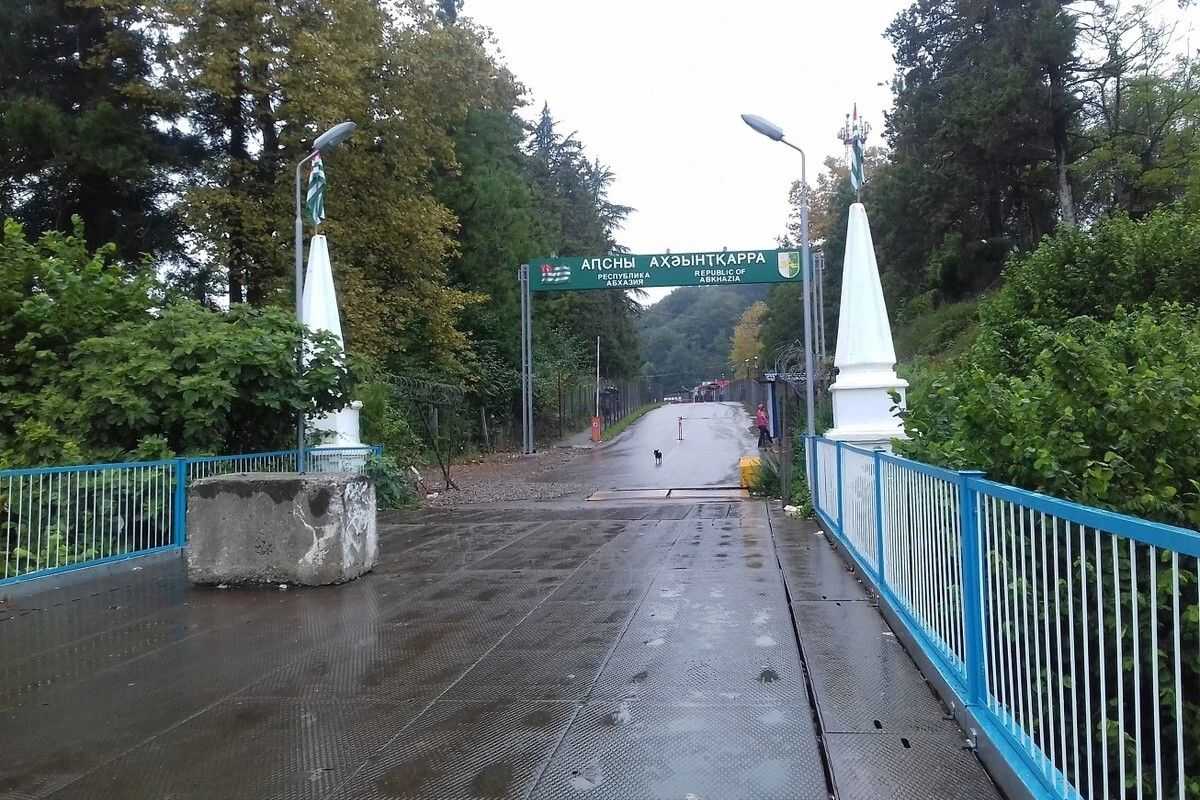

 With between 60–80 road deaths recorded every year, Abkhazia has one of the highest traffic-related mortality rates in the world. Repeated government promises year on year to tackle the problem have come to nothing, and the death toll continues to rise.
With between 60–80 road deaths recorded every year, Abkhazia has one of the highest traffic-related mortality rates in the world. Repeated government promises year on year to tackle the problem have come to nothing, and the death toll continues to rise.
Drunk driving; speeding; reckless driving, especially while overtaking — these are the main reasons for the appalling number of deaths on Abkhazia’s roads.
Ministers of internal affairs come and go every year in Abkhazia, each offering new proposal for radical reforms of traffic rules. Last year a proposal was put forward to ban driving at night, and raising the minimum driving age from 18 to 20. The initiative was not adopted, and nothing has changed.
Almost half of the people responsible for fatal accidents are young people aged from 25–30.
‘I was seeing my child for the last time’
Two years ago, Marina Eshba lost her only son in an accident.
‘He told me that he would go for a ride with his friends in the city. I saw them coming to pick him up through the window and could not imagine that I was seeing my child for the last time. I told him not to speed, and he said that everything would be fine’, Marina told OC Media. Her words turned out to be prophetic, she added.
‘It happened in the city centre. They crashed into another car at full speed. A girl died in the other car and in this car only my son died’, she continued, wiping away her tears.
Anri was 21. He was a third year student at the Abkhazian State University’s Faculty of Economics and dreamt of becoming a businessman. His mother refused to believe he had been killed at first, but now, like many other mothers who have lost children in car accidents, she tries to warn her friends who have children.
‘They feel impunity and do whatever they want’
Angela is 27; she lost her parents in an accident in 2014.
‘My parents were stopped at a traffic light, another car hit them at a full speed. Mum died on the spot, father ended up in hospital. The ‘He wasn’t punished. He had influential relatives, but a criminal investigation was launched. I was left alone with my grief. I have an older brother. He was also really worried back then, but I just fell into the deepest depression’, Angela recalls.
Angela says that she thought of her parent’s killer every day, she wanted him dead, she wanted karma to come back on him. Eventually it did — the man died in a car crash while driving on drugs.
‘I was probably afraid for the people this person could kill again. And there are many people like this in Abkhazia. They feel impunity and do whatever they want’, she added.
People responsible for serious road accidents in are very rarely prosecuted. It is common practice for both parties to reach an agreement, with relatives of the victims receiving compensation in exchange for criminal cases not being launched. This has created an atmosphere of impunity and permissiveness in the country. You can kill a person and not bear any responsibility. No one appeals to the authorities and so there is ‘no victim’.
‘Help to stop the road killers’
The problem has become so acute that an initiative group, We Against Traffic Accidents, was set up in early May to deal with the issue. They recently wrote a letter to the president demanding that he take immediate and decisive action. A list of proposals followed, including the resignation of the current Interior Minister Aslan Kobakhia ‘is not a professional police officer and his methods of reforming the system of the ministry do not help to correct the current situation, and the work of the ministry can not be considered satisfactory’.
‘The public should stop people who are killing our children. We want to call upon all the people to stand together and stop this lawlessness and impunity. Help us to stop the road killers’, one of the authors of the appeal, David Tsushba, told OC Media.
Questions have also been raised about the quality of driving schools, and how driver’s licenses are issued.
During the last briefing on the matter at the Department of Internal Security, employees of the department introduced reports and left. They said that it is possible to get a driver’s license without taking an exam, but simply by paying a bribe of ₽7,000 ($124). The result is that the roads are inundated with drivers who are not even aware of the rules.
Several social projects have attempted to draw attention to the problem, such as ‘Together Against Road Accidents’, which placed posters all over Abkhazia of a baby, with a caption saying that he needs a father.
However, these have not seen much success. People gather for funerals, cry, and go home, while the statistics for road accidents still resemble the death toll of a war.
Grim statistics
In Abkhazia, approximately 30 people per 100,000 die in road accidents each year. The number, as the authorities recognise, is appalling for a country with a population of only 240,000. This compares extremely poorly with the rest of the region, with Russia, Armenia, Azerbaijan, and Georgia having rates of 19, 18, 12, and 10 annual road deaths per 100,000 respectively, according to the World Health Organisation.
In 2016, 152 accidents were recorded, killing 66 people and injuring 232. At the same time, according to unconfirmed reports, most non-fatal accidents are not even recorded by the authorities, so that they do not worsen the already grim statistics.
For the entire post-war period from 1994 to 2016, 1,336 people have been killed on Abkhazia’s roads, with another 5,221 injured. This number is greater than the number of Abkhazians who died on the Western Front during the 1992–1993 War in Abkhazia. The number of deaths on Abkhazia’s roads has already outstripped wartime losses.
A single traffic camera
The latest minister of internal affairs, Aslan Kobakhia, recently proposed introducing surveillance cameras to identify traffic violations. He says that they would reduce the number of traffic violations, bringing the situation under control on motorways in Sukhum, Gagra, and the Psou–Ingur motorway.
So far, only one camera has been installed, on the motorway near the village of Primorskoye in Gudauta District. If the pilot project is successful, the authorities are planning to install similar cameras all over Abkhazia.
There are other problems. Cars, which are almost always bought secondhand, are usually not properly maintained, with airbags usually not deploying during accidents, if they are present at all. At the same time, there is no technical inspection of cars in the republic.
‘I still consider myself a killer’
‘You need to lose something to appreciate life. These words are about me. Three years ago I lost not only my friend, but my life too’, Alkhas, 26, says.
Alkhas and his friend were driving at night in the city in the summer of 2014.
‘I was driving. We were joking, laughing, speaking about cars, and I decided to speed up. I was sure that nothing could happen, I couldn’t even imagine that I would lose control of the car’, he remembers.
‘I drove at a speed of 160 km per hour, the car could not make the turn and flew over the side. My friend died on the spot; I was in coma for 13 days. When I woke up, I was told that he was alive, but in serious condition. Only after a week did I find out that he had died — my friend, my brother, whom I had grown up with’.
Alkhas says that his life completely changed after the accident.
‘I admit that I even tried to commit a suicide. I still consider myself a killer, but people around me try to convince me otherwise. I don’t drive anymore; I prefer public transport. I walk a lot. I think of life and spend more time at home. I want to be alone, to think of the mistakes I made and not to repeat them’, Alkhas says.
While writing this article, a friend of the author was killed in a road accident. He was only 21. It seems that this is a cycle that never breaks.
All place names and terminology used in this article are the words of the author alone, and may not necessarily reflect the views of OC Media’s editorial board.








